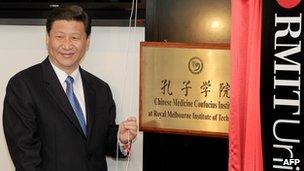China morning round-up: Row over Confucius Institutes
- Published

Friday's newspapers carry extensive coverage of a recent move by the US State Department requiring Confucius Institutes to be accredited.
Confucius Institutes are set up in various countries with the aim of promoting Chinese language and culture.
They are backed by the Chinese government, with operations overseen by the Chinese National Office for Teaching Chinese as a Foreign Language, usually referred to as the "Hanban".
In a 17 May policy directive, the State Department said it was reviewing the credentials of Confucius Institutes in the country.
Chinese academics with a J-1 visa teaching at the institutes would have to leave the country by 30 June as their visas would not be extended, papers including the Shanghai Daily explain.
The US also wants these institutes to gain government accreditation before engaging in teaching activities in American universities.
China Daily says Washington is targeting the institutes and says dozens of Chinese teachers could be forced to leave by 30 June due to the directive.
China's Foreign Ministry said on Thursday that Beijing was communicating with Washington to find a "proper solution", reports say.
Shanghai Morning Post and Guangzhou's Southern Metropolis Daily both term the US directive a "sudden attack" on the institutes.
But Southern Metropolis Daily also reports Washington will draft a new statement to clarify the directive, as the US intention is to make sure that academics and instructors at the institutes apply for the right visas.
At a State Department press briefing on Thursday , spokeswomen Victoria Nuland said, "there was some muddling and messing up, so we're going to sort these out."
"Nobody's going to have to leave the country," Ms Nuland said, "it's all going to get cleared up."
However, officials from the "Hanban" told Beijing News that they believed the reasons cited by the US State Department were "untenable".
The paper also says that Confucius Institutes are accused by some of being China's "cultural spy agency", an accusation that Beijing denies.
Beijing Times says the institutes - with 353 branches across the world - suffer from "sieges" in Europe and the US.
A front page commentary in the People's Daily Overseas Edition criticised Washington's directive as "irresponsible and absurd unilateral action", while China Daily's editorial calls the US action "self-defeating".
The Global Times' bilingual editorial also criticises the State Department directive.
"If the directive comes into force, Confucius Institutes and Schools in the US will face a lot of trouble. The US obviously wants this," said the editorial.
"The issue shows that the US' cultural confidence is not as strong as we thought. The promotion of Chinese language and culture by Confucius Institutes makes some Americans uneasy. Only culturally weak countries have such sensitivity."
In other news, China Daily and People's Daily report the open day at the Communist Party's Publicity Department - which is in charge of the country's propaganda work - for foreign diplomats in Beijing.
A short commentary in the People's Daily says this open day symbolises China's increasing confidence.
The escape of Chen Guangcheng's brother is not mentioned in major newspapers in mainland China, but Ming Pao Daily News and Sing Tao Daily in Hong Kong cover the story.